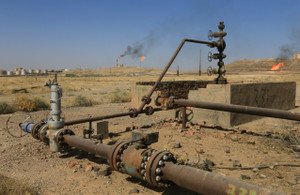Exclusive-BP-Iraq Kirkuk deal must include Kurdistan, region's PM says
Published by Global Banking & Finance Review®
Posted on January 23, 2025
4 min readLast updated: January 27, 2026

Published by Global Banking & Finance Review®
Posted on January 23, 2025
4 min readLast updated: January 27, 2026

Kurdish PM demands Kurdistan's inclusion in BP-Iraq Kirkuk oil deal, citing constitutional disputes and regional tensions.
By Samia Nakhoul
DAVOS, Switzerland (Reuters) - Baghdad and BP's negotiations over a major deal to redevelop Kirkuk's oil and gas fields must include Iraq's semi-autonomous Kurdish region, the Kurdish Prime Minister told Reuters, flagging a potential conflict with the central government.
Control over oil and gas has long been a source of tension between Baghdad and the Kurds, with Kirkuk - a region rich in hydrocarbons - at the centre of the dispute.
The Kurds lost control of the area to the federal government in 2017, after briefly holding it from 2014.
"The area that Baghdad is talking to BP about is a disputed territory. According to the constitution, disputed territories are not a region which can be unilaterally decided by either Erbil or Baghdad," Masrour Barzani told Reuters in an interview on the sidelines of the World Economic Forum in Davos.
"We are not against the development in principle but we are against the mechanism," he said, adding that a trilateral meeting was needed for coordination.
One way the Kurds could insert themselves in the negotiations would be to meet with BP officials separately from the Iraq government, a source with knowledge of the situation said. The Kurds will use their ties with U.S. government to push the Iraqis and BP to involve them.
Iraq and BP are expected to sign a multi-billion dollar deal covering four Kirkuk oil and gas fields by the first week of February.
"Practically, I don't think that we have the leverage to stop that," Barzani said, but called the deal "unconstitutional".
BP and the Iraqi oil ministry did not immediately respond to requests for comment.
Iraqi Oil Minister Hayan Abdel-Ghani told Reuters last week the deal was expected to be larger than a 2023 TotalEnergies deal in Basra, valued at around $27 billion.
Baghdad and BP have already signed a preliminary agreement to evaluate the possible redevelopment of Kirkuk oil and gas fields.
BP was a member of the consortium of oil companies that discovered oil in Kirkuk in the 1920s and has estimated that the area holds about 9 billion barrels of recoverable oil.
The company holds a 50% stake in a joint venture operating the giant Rumaila oilfield in the south of the country, where it has been operating for a century.
NO PROGRESS ON KURDISH OIL FLOWS
A disagreement over the BP deal adds to multiple disputes between the two sides, notably a disagreement that has halted oil exports from the semi-autonomous region since 2023.
Turkey halted oil flows through the Kurdistan Regional Government's (KRG) pipeline in March 2023 after the International Chamber of Commerce ordered the country to pay Baghdad damages of $1.5 billion for unauthorised exports by the KRG between 2014 and 2018.
Negotiations to restart the pipeline have faltered as the KRG, foreign oil companies and the federal government have made conflicting demands.
Barzani said the region has lost more than $20 billion as a result with no compensation by the federal government.
"Iraq never compensated that lost money to Kurdistan and so far there has been no solution," he said.
A last-minute addition by Iraqi Prime Minister Mohammed Shia al-Sudani of an article to a draft bill that was supposed to be voted on in parliament this week rendered the bill "totally unacceptable" to the Kurds, he added.
On Iraq's overproduction of oil above its roughly 4 million barrels per day (bpd) quota agreed with the Organization of the Petroleum Exporting Countries (OPEC) and allies, Barzani said the federal government in Baghdad was "blaming Kurdistan because Kurds are easy to blame".
"Kurdistan is only producing 280,000 (bpd), so how Kurdistan is overproducing? Why the rest of Iraq is not overproducing? These are unfortunate moves by Baghdad to deceive the public opinion and also the international opinion," he said.
"We can no longer remain silent on how Baghdad is mistreating us and trying to cut our share in oil production and the national budget."
(Reporting by Samia Nakhoul in Davos; additional reporting by Maha El Dahan in Dubai; editing by Barbara Lewis)
The main topic is the BP-Iraq Kirkuk oil deal and the Kurdish demand for inclusion in the negotiations.
Kirkuk is rich in hydrocarbons and a point of contention between Baghdad and the Kurdish region.
Kurdistan supports development but demands a trilateral negotiation mechanism.
Explore more articles in the Finance category
